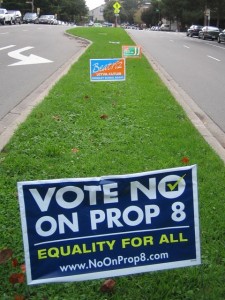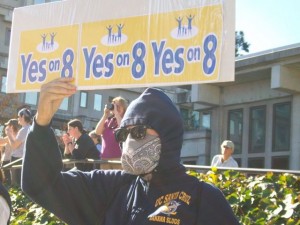Judge hears closing arguments in Proposition 8 case - Oakland North -- North Oakland News, Food, Art
Judge hears closing arguments in Proposition 8 case

Co-lead plaintiff attorney, David Boies.
By: Dara Kerr | June 17, 2010 - 1:12 pm | Filed Under: Front, Politics | Tagged: Charles Cooper , judge Vaughn R. Walker , perry v schwarzenegger , Proposition 8 , Theodore Olson
As Theodore Olson, the attorney for the same-sex couples who sued the state of California for the right to marry, concluded his final remarks in the historic trial, people watching in the San Francisco courthouse’s overflow room stood up and cheered. Wednesday was the last day in the Perry v. Schwarzenegger case, and Olson used his final moments before Chief Judge Vaughn R. Walker to argue that Proposition 8, the 2008 California ballot initiative that prohibited same-sex marriage, was discriminatory.
The California Supreme Court legalized same-sex marriage in May 2008, and in the six months that followed 18,000 same-sex couples got married in California. That November, voters approved Proposition 8, which added a new provision to the California State Constitution reading “only marriage between a man and a woman is valid or recognized in California.” The following day, once this provision was added to the constitution, a ban against gay marriage went into effect.

Campaign poster from the November 2008 ballot initiative.
Shortly after the election, two same-sex couples filed Perry v. Schwarzenegger arguing that Proposition 8 violates their rights to equal protection under the state constitution. Proposition 8’s supporters, specifically the group Protect Marriage, argue that marriage should be exclusively defined as a union between a woman and a man.
Wednesday’s closing arguments have been long awaited, especially in the Bay Area, which has one of the largest populations of gay and lesbian residents in the United States. Heavily covered by the media and closely watched by gay rights groups and supporters of traditionally defined marriage, this trial is considered groundbreaking because it could set precedent in deciding how gay men and lesbians are treated under the law.
The trial began in January in the U.S. District Court and lasted twelve days. During the trial, lawyers for each side laid out a case as to why or why not Proposition 8 was a legal amendment to California’s constitution. The plaintiffs argued that Proposition 8 was not valid under the constitution because it was discriminatory, while the defense emphasized its belief that allowing gays and lesbians to marry would harm the institution of marriage. Judge Walker then gave a list of questions to the attorneys from both sides to answer in preparation for the closing arguments.
On Wednesday, as the closing arguments began, the entrance of the court building was empty. The crowds of protesters that had thronged outside the court during the trial were gone and just a few press members with cameras were set up. But inside the courtroom it was packed. Not only was the main courtroom full, but the overflow room as well. By noon, the court had set up a second overflow room.
“Well, this is an impressive array of legal talent,” said Judge Walker as he welcomed the attorneys to the court. “I was hoping that we could get this case in before the present. But it may be appropriate that the case is coming to closing argument now-June is, after all, the month for weddings.”
Olson, a tall man with thick sandy-colored hair, was the first to take the stand, and in a resolute one and a half hour speech argued that Proposition 8 is unconstitutional because it discriminates against a class of people. “The fundamental constitutional right to marry has been taken away from the plaintiffs and tens of thousands of similarly situated Californians,” Olson began. “Their state has rewritten its constitution in order to place them in a special disfavored category where their most intimate personal relationships are not valid, not recognized and second-rate. The state has stigmatized them as unworthy of marriage, different and less respected.”
He asked permission to play video clips of January’s trial testimony, saying that he could not make a more compelling argument than showing what the plaintiffs and their witnesses had said. One clip showed one of the four plaintiffs, Jeffrey Zarrillo, speaking about his partner while choking back tears. “I love him more than I love myself. I would do anything for him. I want nothing more than to marry him,” Zarrillo said.
Olson also played the testimony of a few academic witnesses who testified during the trial. One witness, Nancy Cott, an American history scholar, described the history of marriage and spoke about how important marriage has been to humans over time, saying, “When slaves were emancipated, they flocked to get married. And this was not trivial to them, by any means.”

Proposition 8 supporter. Photo by santacruztacean via Flickr Creative Commons.
When defense attorney Charles Cooper, a slender man with a slight southern accent and white hair parted down the middle, next took the stand, he immediately focused on the belief that marriage should be defined as a union between a man and a woman. “The marital relationship is fundamental to the existence and survival of the race,” he said. Same sex marriage “represents a threat to society’s interest,” he said, and asserted that ultimately marriage should be about procreation-and, inherently, same-sex couples cannot procreate.
Procreation and the value of raising children in a home with both a mother and father were the central themes of Cooper’s argument. “To whatever extent children are born into the world without this stable, enduring marital union, raised and responsibility taken for the offspring by both of the parents that brought them into the world,” he said, “then a host of very important and very negative social implications arise and potential social consequences arise.”
This confused the judge, who asked, “But the state doesn’t withhold marriage from people who cannot make children of their own. Are you suggesting it should?” Cooper said that he was not suggesting this notion, but also didn’t give a definitive answer as to why same-sex couples should be treated differently.
Once Cooper had finished his two-hour and fifteen-minute closing argument, Olson was given 45 minutes for a rebuttal. During this time, Olson brought up the trial testimony of one of Cooper’s January witnesses, David Blankenhorn, the president of the Institute for American Values, an organization that studies marriage and family life. Olson pointed out that during the trial, in a strange twist, Blankenhorn agreed with some of the facts Olson presented under cross-examination, including the idea that heterosexual couples can harm the institution of marriage.
“I meant to say, for our purposes, heterosexuals did the deinstitutionalizing,” Blankenhorn had said during the January trial, referring to the fact that straight couples have already undermined marriage as an institution by divorcing or having children out of wedlock. “Deinstitutionalization didn’t just crop up when we started talking about giving same sex couples marriage rights. It started long before that.”
To a standing ovation in the overflow room, on Wednesday Olson finished his rebuttal by quoting Blankenhorn, concluding that taking away the constitutional right to privacy and freedom to marry “is not acceptable under our Constitution. And Mr. Blankenhorn is absolutely right-the day that we end that, we will be more American.”
Judge Walker’s ruling on the constitutionality of Proposition 8 is expected within the next month. Attorneys on both sides have said that if they lose, they will appeal to the next court, the Ninth U.S. Circuit Court of Appeals in San Francisco, and will fight this case to the U.S. Supreme Court if need be.
Filed Under: Front, Politics
Tagged: Charles Cooper , judge Vaughn R. Walker , perry v schwarzenegger , Proposition 8 , Theodore Olson
This entry was written by Dara Kerr, posted on at 1:12 pm, filed under Front, Politics and tagged Charles Cooper, judge Vaughn R. Walker, perry v schwarzenegger, Proposition 8, Theodore Olson. Bookmark the permalink. Follow any comments here with the RSS feed for this post. Post a comment or leave a trackback: Trackback URL.
via oaklandnorth.net
Posted via web from davidfcooper's posterous